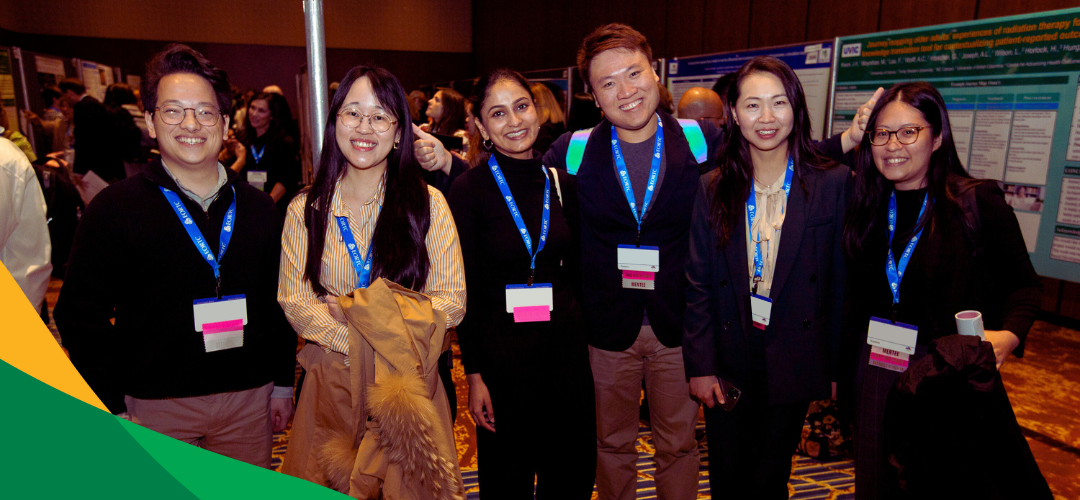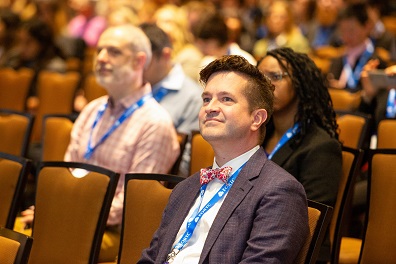Membership

Together, we are creating a future in which patient perspective is integral to health research, care and policy.
Why Join ISOQOL?
Find Your Community
ISOQOL members cultivate global connections and form lifelong bonds with fellow professionals from a diverse group of industries, sectors and fields who seek to advance the science of HRQL.
Develop Your Career
Students, new investigators, retirees, and established or late-career professionals all have a place at ISOQOL. Members have special access to:
- Online and in-person networking, collaboration, publication and speaking opportunities
- Professional mentor/mentee programs
- The most recent job openings related to HRQL research
- Participate in society governance
Learn and Educate
While many of ISOQOL’s education initiatives are open to anyone with an interest in the theory, methods, standards and best practices, or application of HRQL research, members receive discounted rates. By participating in Special Interest Groups (SIGs) and Committees, members are also able to directly influence the education opportunities available.
Stay Informed
New health care trends and technologies are emerging rapidly with HRQL research playing an increasingly important role in health care decisions and policy. ISOQOL keeps members informed of the latest news through publications, online communications and in person events.

Member Resources
- Discounted registration for education and networking events, including the Annual Conference, virtual symposia, webinars and online education
- Submission discount for the ISOQOL-owned, open access journal, Journal of Patient-Reported Outcomes (JPRO)
- An online subscription and discounted print subscription to the Springer-owned Quality of Life Research journal (QLR), affiliated with ISOQOL
- Leadership and volunteer opportunities
- Networking and collaboration opportunities through SIGs
- Exclusive access to the ISOQOL Member Directory
- Eligibility for awards and travel scholarships
Who Can Join ISOQOL?
Individuals at any career stage may join ISOQOL. Membership to ISOQOL is open and no application is required – all who want to join, can join.
Members represent the following fields:
- Academia: Anyone employed by or participating at a university or teaching facility.
- Clinical Practice: Anyone engaged in medical training or employed by a hospital, clinic, etc. This includes clinicians and health care personnel.
- Regulatory Agency: Anyone employed by a government or regulatory agency/organization.
- Business/Consultancy /Insurance Company: Anyone employed by a business entity that provides services in HRQL fields.
- Pharmaceutical/Biotech/Medical Device Company: Anyone employed by a manufacturing entity or biotech entity in HRQL fields.
- Patient Research Partners: Anyone who is a patient, represents a group of patients, or is affiliated with a patient advocacy group.
- Other: Examples include but are not limited to society and association staff

Membership Dues
ISOQOL membership dues vary depending on the individual member’s background and career stage. We strive to ensure that membership is affordable for everyone.
Membership is available at the following annual rates:
Regular Membership
$165.00 USD
Professionals in the field of HRQL and patient-centered outcomes (PCOs) qualify for this rate.
Regular membership offers full benefits and privileges including voting and the ability to hold leadership positions within the society.
Special Membership
$45.00 USD
Individuals who reside in an eligible developing nation or who have an annual income less than $15,000 (USD)/year qualify for this rate.
Special membership offers the same member benefits and privileges as regular membership, but at a discounted rate.
Patient Research Partner (PRP) Membership
$165.00 USD – Regular
$60.00 USD – Affiliate
Patient partners, professionals or individuals interested in supporting the purposes of ISOQOL and the field of HRQL and PCOs qualify for this rate.
Regular PRP membership offers the same member benefits and privileges as full membership.
Affiliate PRP membership offers limited membership benefits including membership to Committees, Task Forces and Special Interest Groups, but does not include the privilege of voting, or holding elected leadership positions, including holding a board seat.
Student/Trainee Membership
$60.00 USD
Individuals who qualify for this membership type include anyone enrolled in:
- a full-time accredited training program in a relevant field
- a pre/postdoctoral program
- a resident program
- a fellowship program
Student/Trainee membership offers the same benefits and privileges as regular membership, but at a discounted rate.
Student/Trainee members must provide information about their education program, expected completion dates, and proof of status with their membership form or via their online profile.
Retiree Membership
$60.00 USD
Individuals who have retired and/or are no longer practicing in the field of HRQL and PCOs, but wish to continue contributing to the field and the society qualify for this rate.
Retired membership offers the same member benefits and privileges as regular membership, but at a discounted rate.
Please note, ISOQOL membership operates on a calendar year (January to December). All 2026 dues payments will be valid from now through 31 December 2026.
Please allow up to one business day for membership to update. For immediate member access, contact info@isoqol.org.
Member Volunteers
Volunteers gain valuable professional experience while also investing in the growth of ISOQOL and the field of HRQL research.
ISOQOL volunteers build their resumes, hone their leadership skills, and forge vital professional connections. In return, volunteers provide mentorship to early-career professionals, leadership to committees and strategic initiatives, expertise to scientific programs, and more.
Members from all professional backgrounds and career stages are invited to volunteer. Unless otherwise stated, you must be an ISOQOL member to volunteer for any of the opportunities below.
How to Volunteer
ISOQOL has a variety of volunteer opportunities with different kinds of work and varying levels of commitment. Complete the interest form above to tell us how you would like to volunteer with ISOQOL!
Virtual Opportunities
FLEXIBLE COMMITMENT
Volunteers work digitally (through email, survey, or another digital platform) on their own, at their own pace with a set deadline.
Conference Abstract Reviewer
Abstract reviewers serve a vital role in the scientific program planning process by ensuring the quality of educational content presented at the ISOQOL Annual Conference. Volunteers review each proposal or abstract based on the provided reviewer criteria and provide both a rating and comments to assist the Scientific Program Committee with abstract selection. Serving as a reviewer is an excellent way to build your resume, share your expertise and support ISOQOL.
ISOQOL Staff collects the area of expertise and availability via a survey every year. Indicating interest in reviewing abstracts on the ISOQOL Volunteer Interest Form will include you in the recipients list for the next conference’s reviewer survey.
Expected Commitment
Abstract reviewers can choose what type of abstracts they wish to review: workshop proposals, symposia abstracts and/or general abstracts (oral/brief/posters). There are two review periods depending on the abstract category: workshop proposals and symposia abstracts undergo peer review in January-February and general abstracts (oral/brief/posters) are peer reviewed in April-May. Each review period is three to four weeks long. Specific review periods are posted on the Annual Conference page.
Volunteers are assigned 5-15 abstracts to review and can choose to complete reviews quickly in one sitting or slowly throughout the review period.
Information regarding the call for 2026 abstract reviewers will be posted as available.
Journal Reviewer
Peer review is an essential part of research publication. Although ISOQOL encourages all members to volunteer as a peer reviewer for either the ISOQOL-owned Journal of Patient-Reported Outcomes (JPRO) or the Springer-owned and ISOQOL-affiliated Quality of Life Research Journal (QLR), you do not need to be an ISOQOL member to volunteer.
LOW COMMITMENT
Volunteers primarily work digitally on their own and may be asked to attend anywhere from 1 to 4 conference calls per year.
Awards Subcommittee
This subcommittee of the Membership Committee is charged with reviewing award applications/nominations and recommending deserving recipients to ISOOQL Leadership.
These awards include the President’s Award, Donna Lamping Emerging Leader Award, Outstanding Volunteer Service Award, and Dennis Revicki Memorial Award.
Travel Scholarship Selection Subcommittee
The Travel Scholarship Selection Subcommittee is charged with reviewing Annual Conference travel scholarship applications and recommending deserving recipients to ISOQOL Leadership. This subcommittee of the Membership Committee is made of three selection panels, one for each scholarship type.
MODERATE COMMITMENT
Volunteers attend conference calls at a set time. These typically last 1 hour once a month. Some of these opportunities require minor digital work between calls, while others require no digital work between calls. Depending on your response to the volunteer interest form, we will match you with the right group.
Committees
Committees are charged with oversight of ongoing activities driven by the Strategic Plan and direction from the Board. Each committee is composed of a limited number of rotating members selected to serve for limited terms (i.e., three years).
Typical committee work may include:
- Monitor on-going ISOQOL operations
- Identify issues with established procedures and propose solutions
- Review, gather and evaluate information
- Address member feedback and concerns
- Recommend courses of action to the ISOQOL Board
Call for Volunteers: Annual Conference Program Committee
ISOQOL Leadership welcomes recommendations from ISOQOL members for candidates to serve on the 2026 and 2027 Annual Conference Committees. Please consider applying yourself or nominating another ISOQOL member for one of these important positions. Nominations are due 19 November, while final applications are due 3 December. Learn more about the open positions, their responsibilities, and how to nominate or apply by clicking the link below.
Learn More
Task Forces
Task forces are charged with oversight of a time-limited activity identified by the Board, potentially in response to the strategic plan, committees and/or SIG activities. Each task force is composed of a limited number of members serving only the length of the task force charge.
Typical task force work may include:
- Examining and reviewing specific ISOQOL processes and proposing changes for improvement to the Board
- Developing new or expanding existing ISOQOL programs
- Completing large-scale reviews and developing best practices on a specific topic
Expected Commitment
Responsibilities of task forces vary widely and so does the amount of commitment needed to participate. Depending on the need, some task forces may require intensive work.
In-Person Opportunities
Volunteers work in-person at the Annual Conference.
LOW COMMITMENT
Judge
Each year, ISOQOL recognizes the best overall oral and poster presentations at the Annual Conference made by full-time students and new investigators, as well as the best posters from all poster submissions.
Judges for the Student/New Investigator Poster and Oral Presentation Awards and the Outstanding Poster Award are responsible for:
- Attending the Annual Conference
- Attending their assigned finalist presentations (3-6) at their scheduled times
- Completing a judging ballot received in their registration packet
- Returning their ballot to ISOQOL staff at the Registration Desk
Moderator
Moderators are a vital part of the Annual Conference and are critical to the overall success of their assigned session. Moderators are needed for the following sessions: plenaries, symposia, SIG symposia, oral, and oral brief. Moderators for symposia and SIG symposia are indicated at the time of their abstract submission, while moderators for other sessions are individually invited.
Moderators are responsible for:
- Attending any needed planning calls prior to the conference (applicable for plenaries and SIG symposia only)
- Familiarizing themselves with each of the abstracts/presentations in their session
- Connecting with the presenters via email prior to the conference
- Attending the Annual Conference
- Arriving to the session room at least 10-15 minutes prior to the scheduled start time
- Providing a brief introduction for the session
- Introduce each speaker before their presentation
- Timekeeping and ensuring each speaker stays within their allocated time
- If the session has a Q&A period, providing the impetus for it while actively seeking questions from the audience
- Closing the session
Speed Networking
Leadership Opportunities
Volunteers work both digitally and through conference calls. These opportunities have a higher time commitment than others.
HIGH COMMITMENT
Associate Editor
Associate Editors support and advise Editors-in-Chiefs by:
- Coordinating peer review
- Acting as a liaison between authors, reviewers and the Editorial Board
- Writing short editorials, news and research highlights
- Ensuring manuscripts meet journal and editorial standards
Associate Editor applicants are expected to have past experience as a peer reviewer. The appointment of applicants for the Journal of Patient-Reported Outcomes (JPRO) is subject to the approval of the ISOQOL Executive Committee. The appointment of applicants for Quality of Life Research (QLR) is subject to the approval of the journal owner and publisher, Springer.
Expected Commitment
Volunteers are expected to serve a three-year term for JPRO or a four-year term for QLR. Associate Editors are eligible for small stipends.
The Role of an Editorial Board
Call for Associate Editors
Both the ISOQOL-owned Journal of Patient-Reported Outcomes and the Springer-owned journal Quality of Life Research are seeking to recruit new Associate Editors.
INTENSIVE COMMITMENT
Editor-in-Chief
JPRO and QLR each have two Editor-in-Chiefs (EICs). EICs are responsible for the overall editorial policy, planning and coordination of the journal. The day-to-day responsibilities of an EIC include:
- Initial screening of manuscript submissions for relevance and quality
- Assignment of manuscripts to members of the Editorial Board (including him/herself) for further peer review
- Maintaining close contact with the editorial office at Springer, which coordinates the logistics of the editorial management process
- Advising the editorial board and the editorial management team on matters arising both of a general policy nature, and regarding specific manuscripts.
The responsibilities and tasks of the EICs are primarily scientific in nature. Responsibility for the business and financial management of the journal rests with the publisher, the ISOQOL board and the ISOQOL executive management team. The editorial management process is fully automated with excellent logistical support provided by Springer.
EIC applicants are expected to have past experience as an Associate Editor. The appointment of applicants is subject to the approval of the ISOQOL Board of Directors.
Expected Commitment
Volunteers are expected to serve a four-year term and can expect to spend a minimum of 10 hours per week on the journal. Editors-in-Chief receive stipends.
There are currently no open Editor-in-Chief positions. An official call for volunteers will be released to the membership when there is an opening.
Annual Conference Co-Chairs
The Annual Conference Co-Chairs manage the scientific content of the ISOQOL Annual Conference. They develop the theme and plenary topics, invite plenary speakers, and select peer-reviewed abstracts to develop a diverse scientific program. They are charged to ensure the highest quality educational program, promote participation, and help with funding efforts.
View Co-Chair Roles and Responsibilities.
Co-Chair applications for the 2027 Annual Conference, to be hosted in Canada, are open now through 3 December 2025. Nominate a colleague or apply for the position today!
Board of Directors
The applications period for the 2026 Board of Directors will open in January 2026.
Nominations for the Board of Directors may be submitted at any point in the year. If you would like to nominate a colleague, view the instructions and nominations form here.
The ISOQOL Board of Directors will act in accordance with the ISOQOL Bylaws and the established policies. The responsibilities outlined in ISOQOL Bylaws Article VI (2009) state “the Board shall be responsible for directing the efforts of the Society toward the fulfillment of its purposes and for the control and oversight of all operations, including programs and services as well as the finances. The Board shall establish and maintain a Policies and Procedures manual which shall govern the internal organization, operations, and timetable of the Society.”
SIG Opportunities
Special Interest Groups (SIGs) are responsible for ongoing activities driven by the grassroot interests of SIG members. SIGs offer unique volunteer opportunities.
LOW COMMITMENT
SIG Members
Joining a SIG and being an active member are the first steps to getting involved with ISOQOL SIGs! View instructions for joining a SIG here. SIG member responsibilities may include:
- Attending the SIG meeting at the Annual Conference
- Engaging with SIG posts on Teamwork
MODERATE COMMITMENT
SIG Projects and Working Groups
Some SIGs have working groups focused on specific topics or projects. Calls for working group volunteers or project participants are typically posted via the Teamwork Message Boards or at a SIG’s meeting at the Annual Conference. Contact the current SIG leaders if you have questions about current or upcoming opportunities.
HIGH COMMITMENT
SIG Chairs
SIG chairs are charged with helping SIG members coordinate collaboration activities. They are also responsible for sharing projects with Board Liaisons to help determine when Board guidance is needed. For example, many SIG members collaborate on papers together. Your SIG chair and Board Liaison may recommend SIG papers meeting certain requirements to the Board for official ISOQOL endorsement.
Expected Commitment
SIG projects vary widely and so does the amount of commitment needed to participate.
SIG chairs are responsible for:
- Overseeing SIG activities and promoting engagement with SIG members
- Completing an annual orientation call with ISOQOL staff
- Reviewing their SIG’s description on the ISOQOL website and Teamwork to determine if any revisions are needed
- Completing a SIG Annual Report form
- Working with ISOQOL staff to secure nominations for next term’s SIG leadership
- Organizing the agenda for an in-person SIG meeting at the Annual Conference and ensuring a SIG leader or other volunteer is present to lead this meeting
Calls for SIG chairs and SIG projects are coordinated by the SIGs themselves, therefore all calls for volunteers are issued via the Teamwork Message Boards. Contact the current SIG leaders if you have questions about current or upcoming opportunities.

The International Society for Quality of Life Research (ISOQOL) is a global community of researchers, clinicians, health care professionals, industry professionals, consultants, and patient research partners advancing health related quality of life research (HRQL).
Together, we are creating a future in which patient perspective is integral to health research, care and policy.
